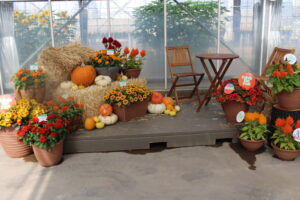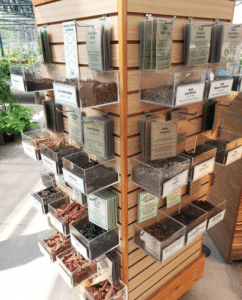Embarking on an Uphill Climb
In the Himalayas, hikers who decide to tackle Mt. Everest will often hire sherpas, local men with strong endurance and a good sense of the terrain, to guide them on their treks through unfamiliar, difficult territory.
In any situation, it never hurts to have someone along who’s been there before and can share their experiences or at least provide solidarity and a friendly face during hard times.
So let these five people be your sherpa guides on the journey ahead; strap on your gear for the coming year, lean on their expertise and set off on your way.
Brace for Spring Fever
Sid Raisch, Horticultural Advantage
www.horticulturaladvantage.com
[email protected]
As I write this, the U.S. and world economies are in turmoil, and a new president and administration will be taking office soon the future is much less predictable than I can remember during other political changes in the past. This is a good year for a very basic, “nuts and bolts” prediction. Garden centers that have struggled in the past but can focus on the basics this year will have a great opportunity. Those that continue to grab at straws and follow the lead of industry-favored, but often unprofitable, garden centers will move closer to failure.
If we follow the belief that the best predictor of future success is past results, it will play out that spring fever will arrive in epidemic proportions just ahead of spring weather, as it has every year for as long as there have been people on Earth. As usual, if a garden center has reasonably good weather, they will have a good spring season as defined by profit and not just gross sales, if their processes enable them be profitable.
Economic and political uncertainty has, in the past, been generous to our industry. I expect the same for spring of 2009, as consumers who have enough income for indulgences shift spending from expensive cars, second homes and vacations to affordable luxuries that feed their spring fever. This will favor garden center retailers who have the capacity for an increase in business, and the guts to be in playing position with aggressive marketing aimed at gaining market share from competitors who run scared and cut back.
Garden centers that focus their marketing efforts on value rather than excessive sale pricing stand to make a very strong profit from the peak season. It’s a simple concept, but so many people are failing at it because they look too often at the price promotions of their competitors rather than the profitability of their own company. Holding to this discipline, discounting will not be necessary if we are bold enough to recognize the role of spring demand. Restock staples rapidly rather than overstocking for the space and customer traffic, which leads to crowded aisles and poor product quality.
Luck is when preparation meets opportunity, and this spring calls for getting the store in retail-ready form again this spring. Discounting prices to survive on the low margin edge are out. Dropping the ball on margin-building tasks again this year will bring more garden centers to the crossroads where the margins they earn are less than their costs of doing business. Let’s clean up the store and get real about managing the business side of the business so we can see the brighter days ahead together.
Keep a Tight Ship
Teri Smith, Smith’s Acres
Niantic, Conn.
www.smithsacres.com
[email protected]
This should be an interesting year for all of us in retail. We all need to sharpen up by running things in a tighter fashion. We need to manage waste more efficiently now, more than ever before. We grower/retailers need to watch our shrinkage in the greenhouse: Growing a little less than what you anticipate selling might be a good idea for some items because product left on the bench is money out of our pockets. Many of us have had the attitude that it’s OK to throw out unsold product because “it didn’t really cost us that much.” Wrong. Anything that is placed on a bench and heated throughout the winter definitely costs us money. Pay attention to what sells well for you and what you may be able to purchase from another source in smaller quantities. Do we really need 24 varieties of petunias? Perhaps now is the time to streamline a bit.
Vegetable gardening will remain one of the strongest categories. Between the organic and locavore movements, people are getting serious about knowing where their food comes from. Shame on us if we run out of tomato or cucumber plants on Memorial Day weekend. That’s lost sales that we’ll never get back. Be prepared with plenty of vegetable plants, seeds, compost, manure and organic pest controls.
Container gardening will continue to be huge. Here’s an example of a great money maker: Plants, soil and a pot. The sum is worth much more than the individual components! Charge accordingly for your imagination and the little bit of time that it took to put the creation together. Preplanted deck boxes and window boxes will also continue to be good sellers. Containers full of herbs and vegetables should fly off the shelf. Fruit trees and bushes will also be popular.
We need to be sure that we offer our customers a good value for their dollar. We should not offer “cheap” items, but we need to be sure that the perceived value is high for our products and services. Customer service is crucial. Loyalty programs that emphasize benefits other than just price will be greatly appreciated by the consumer. We need to be sure that our customers know how important they are to us. Creating a shopping “experience” is important.
Consumers also want to feel that they are shopping in a store that is successful and will be around for a while. Stop with the gloom-and-doom predictions. I am not advocating playing ostrich, but I cringe when I overhear some shop owners complaining to their customers about how bad business is. A positive outlook is contagious. Your employees and customers will appreciate the positive feeling in your store. Be sure that you portray your business as successful. Your stores MUST be clean and neat soap and water are practically free there’s no excuse for looking rundown. Paint may not be free, but it is so cheap that you should be ashamed if something in your garden center doesn’t get a fresh coat this year. It goes a long way in making things look new.
Our employees will really have to become strong salespeople and not just spend their time with a hose in their hand. We need to teach them how to “upsell.” My employees each have an item or two that they truly believe in, and those add-on sales really help the bottom line. The fact that these items help to make the gardener more successful is an important component. We shouldn’t just sell them “stuff” but rather products that will enhance their garden or home.
The Internet and e-mail marketing are becoming more and more important. Advances in technology and the comfort levels of our younger consumers with that technology are a little frightening to us older owners. So if you can’t maintain your website, hire someone to do it for you. (Notice I assumed that you all have websites). Check into one of the low-cost email marketing companies. I know that I need to learn about blogging and Facebook and YouTube terms I’d never heard of two years ago, but that’s where the younger consumer is comfortable. Several seminars I’ve been to this past year have been about those foreign-sounding terms. We need to make sure that we never stop learning, because if we do, someone younger with fresher ideas will be right there to lure our customers away.
Make the Right Cuts
Jonathan Bardzik
American Nursery & Landscape Association
www.anla.org [email protected]
We all know that our economy is pretty rough right now, but at some point the recession will end and spending will increase again. The question is how well you as a business and our industry as a whole are positioned to rebound. Will our businesses be ready to take advantage of fresh opportunities, or will they be hampered by stale ideas, bad inventory decisions and adverse legislative and regulatory decisions? There is definitely some significant tightening up to do, but the “tourniquet” needs to be carefully applied: Cutting off the flow of blood to the wound helps the healing begin, but cutting off circulation to the head and heart weakens the whole body.
Businesses that make careful inventory decisions will have the product they need in the spring to deliver good quality and value to their customers. Those fearing an early commitment may very well end up making poor decisions, reacting to a time crunch rather than careful analysis and projection. Firms who stop investing in the development of current staff, in addition to cutting back on total labor this spring, will find their team uninspired and tired when a rejuvenated market returns. Finally, investing in government relations and lobbying at the state and national level may seem like a luxury, but in this time of great political change, it is critical to protect hard-won gains and take advantage of emerging possibility.
So, cut early and often: It is critical for short-term survival. But cut carefully: That is critical for long-term success.
Restore Consumer Confidence
Faith Savage
Goldsmith Seeds
www.goldsmith.com
[email protected]
Similar to our country’s political atmosphere, our economy, and our world in general there is much change to be expected and anticipated. I think there will be some serious challenges for retailers.
Our primary focus must be on retaining or restoring customer confidence. With so many prominent retailers in all segments declaring bankruptcy or floundering, this focus will be more important than ever. As an industry, we can accomplish this by focusing on messaging that resonates with the consumer. Messaging that addresses “decorating” or “enhancing the value of the home” are motivators that will urge the consumer to loosen those purse strings. Making sure your garden center carries the best genetics will ensure maximum success when your customer does buy. The more successful they are, the more value they will feel they got and the more they will be willing to come back for that “feel-good” experience.
In this challenging climate, we must all work together breeders/suppliers, growers and retailers to ensure everyone’s success. So let’s roll up our sleeves and get to it!
The Consumer Changeth!
Stan Pohmer, Pohmer Consulting
www.pohmer-consulting.com
[email protected]
Like never before, the net effect of the recession, the housing bubble bursting, the credit industry tightening and low consumer confidence in their future will be a fundamental change in consumer values and purchasing behaviors, a change that will be with us long after this recessionary period ends. Conspicuous consumption is being replaced with conscious consumerism. Consumers are looking for products and services that are personal to them and can provide a benefit to them not just ego-driven purchases to show off to their neighbors. They’re looking for real value, not just the lowest price (though the papers and media are filled with “lowest-price” messages), and things that can add value to their lives and provide personal fulfillment.
Consumers are learning to value positive experiences not only from their shopping experience but from their pleasure with the products once they get them home. And they will continue to reward companies that provide this as they make the hard decisions on where to spend their smaller discretionary purchasing dollars.
This will be the year when every retailer will need to be more in tune with the customer than at any time in the past. “Business as usual” is not an option for success in this challenging retail environment. Creativity and tapping into the creativity of your supplier partners; building excitement; communicating the positive messages of the benefits of our products; a personalized shopping experience; and outstanding execution will be what differentiates those who survive and thrive in these economic times and those who don’t.
This year will not be for the faint-of-heart managers who aren’t committed to change and adaptability. Leadership, management skills and vision will be cornerstones required to build your business and motivate your teams and customers.
The consumer changeth… and as they do, we need to also…
















 Videos
Videos





